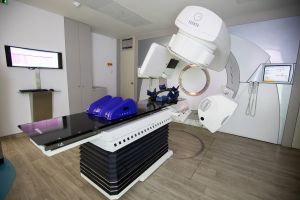by
John R. Fischer, Senior Reporter | May 12, 2022

A new AI application can detect if a patient's tumors will regrow following radiotherapy.
A new AI tool may be able to predict a cancer patient’s chance of their disease relapsing after undergoing treatment.
Researchers at the Royal Marsden NHS Foundation Trust; the Institute of Cancer Research, London; and Imperial College London have developed a model with machine learning that predicts the likelihood of tumors growing back following care,
reported The Guardian. The world-first study, they say, could provide insights on monitoring patients post-treatment.
Doctors currently use traditional methods that focus on the original amount and spread of cancer to predict chances of recurrence. Lee and his colleagues say their solution may not result in better outcomes than these approaches, but may relieve fears in patients, as relapsing is a “key source of anxiety” for many. The tool could detect earlier than conventional approaches if patients who are considered high-risk are in danger of relapsing and enable them to be treated immediately. It could also spare low-risk patients from unnecessary follow-up scans and hospital visits.



Ad Statistics
Times Displayed: 2839
Times Visited: 27 Fast-moving cardiac structures have a big impact on imaging. Fujifilm’s SCENARIA View premium performance CT brings solutions to address motion in Coronary CTA while delivering unique dose saving and workflow increasing benefits.
“This is an important step forward in being able to use AI to understand which patients are at highest risk of cancer recurrence and to detect this relapse sooner so that re-treatment can be more effective,” said Dr. Richard Lee, a consultant physician in respiratory medicine and early diagnosis at the Royal Marsden NHS Foundation Trust, in a statement.
The researchers used their model in a retrospective study to identify non-small cell lung cancer in patients at risk of recurrence. NSCLC makes up nearly five sixths (85%) of lung cancer cases and is often curable if caught early. But over a third (36%) of patients experience recurrence in the U.K.
All participants had previously completed radiotherapy treatment. Using prognostic factors and clinical data from 657 patients treated at five hospitals, the model was more accurate than traditional methods in predicting outcomes. It also categorized patients into low- and high-risk groups of recurrence, showed how much time they had before their cancer recurred, and explained their overall survival two years after treatment.
The scientists hope to eventually roll out the solution throughout the U.K. and around the world. “Right now, there is no set framework for the surveillance of non-small cell lung cancer patients following radiotherapy treatment in the U.K.,” said study lead Dr. Sumeet Hindocha, a clinical oncology specialist registrar at the Royal Marsden and Imperial College London. “This means there is variation in the type and frequency of follow-up that patients receive. Using AI with healthcare data may be the answer. As this type of data can be accessed easily, this methodology could be replicated across different health systems.”
Demographic factors included age, gender, BMI, smoking status, intensity of radiotherapy and tumor characteristics.
The study was supported by the Royal Marsden Cancer Charity and the National Institute for Health Research.
The findings were published in The Lancet’s eBioMedicine journal.

